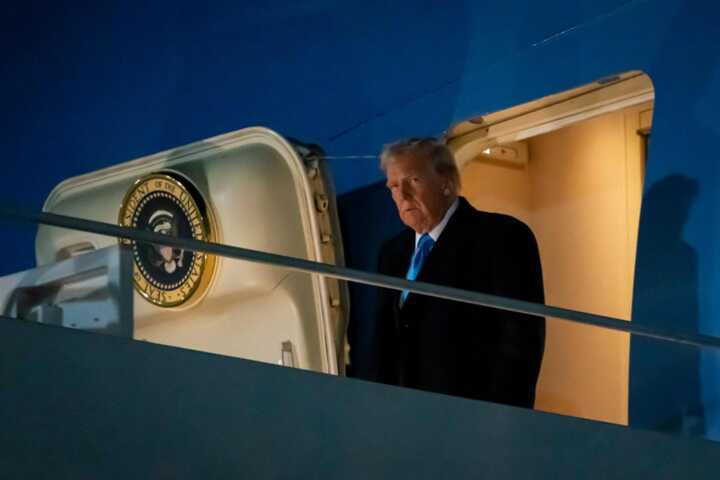President Donald Trump has paused tariffs on Mexico and Canada after each country agreed to send 10,000 troops to the border to stop migrants and drugs entering the US.
The move has stoked tensions between the nations – and others which could be affected, including China and potentially the UK and European Union, reported by Metro.
Though Trump and Mexican President Claudia Sheinbaum struck a deal on Monday to delay his 25% tariff for one month, Sheinbaum vowed to help ‘reinforce’ the border between the US and Mexico by sending National Guard troops ‘immediately’.
‘It was a very friendly conversation wherein she agreed to immediately supply 10,000 Mexican Soldiers on the Border separating Mexico and the United States,’ Trump wrote on Truth Social of his communication with Sheinbaum.
‘These soldiers will be specifically designated to stop the flow of fentanyl, and illegal migrants into our Country.’
There are worries the tariffs could soon affect the United Kingdom, which Trump said was ‘out of line’ when it came to trade.
What are tariffs, and how do they work?
Tariffs are a form of tax applied on imports from other countries.
For instance – if a company in China is importing goods to the United States, they would pay extra tax, which is given to the government.
Tariffs aim to protect domestic manufacturers in the country, allowing business to boom.
But they can backfire. Goods subject to tariffs can become much more expensive and harder to sell.
How could the tariffs affect the UK?
If the US issues a blanket tariff on British exports, it could slow the growth of the economy.
There could also be an increase in borrowing costs and divert industrial exports to the UK – which could potentially hurt British businesses.
Trump told the BBC: ‘The UK is way out of line but I’m sure that one… I think that one can be worked out.’
Downing Street said: ‘We’ve got a fair and balanced trading relationship which benefits both sides of the Atlantic.
‘It’s worth around £300bn and we are each other’s single largest investors, with £1.2tn invested in each other’s economies.’
The Telegraph points out that the UK could avoid a major impact, as most of the UK exports to the United States are services, which aren’t directly impacted. But fishing and energy could be badly affected.
How will the tariffs affect Mexico and Canada?

Mexican President Claudia Sheinbaum speaks during a press conference at the National Palace in Mexico City on Monday (Picture: Getty Images)
Sheinbaum also called it a ‘very respectful’ conversation and said she expects the agreement to bring ‘good results’. The US will work with Mexico to prevent guns from being trafficked to the south.
During the delay, US Secretary of State Marco Rubio, Secretary of Treasury Scott Bassent and Secretary of Commerce Howard Lutnick will speak with Mexican officials to try to come to a permanent deal.
The agreement comes two days after Trump announced a 25% tariff on Mexico and Canada and an additional 10% against China.
Tariffs on Canada and China are still set to go into effect on Tuesday via an executive order to be signed by Trump.
Trump on Monday accused Canada of treating the US badly before a conversation with Prime Minister Justin Trudeau was scheduled at 3pm.
Trudeau on Saturday evening stated that Canada would respond by imposing 25% tariffs on US goods. A senior government official in Canada on Monday did not see a short-term deal panning out between the two countries as it did with Mexico.

Canadian Prime Minister Justin Trudeau announced a deal with the US for a 30-day delay on tariffs (Picture: Shutterstock)
But hours before the tariffs were due to go into effect, Canada secured its own 30-day delay.
‘I just had a good call with President Trump. Canada is implementing our $1.3 billion border plan — reinforcing the border with new choppers, technology and personnel, enhanced coordination with our American partners, and increased resources to stop the flow of fentanyl,’ wrote Trudeau on X (formerly Twitter) late afternoon Monday.
‘Nearly 10,000 frontline personnel are and will be working on protecting the border.’
Canada has agreed to create a fentanyl czar role and committed 200 million Canadian dollars to gather intelligence on the drug trade.
The neighbouring countries narrowly avoided a trade war. Trump is using tariffs to pressure the three countries into restrict migrants and fentanyl from crossing into the US, and insisted that they will not drive up prices for Americans. He claims that other countries will front the costs, but that has not been proven.
Read more similar news:
Comments:
comments powered by Disqus


































